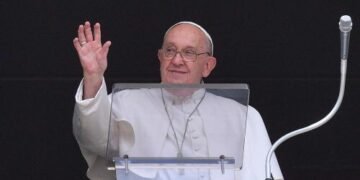By Charles Igwe
In his midday Angelus address on Sunday in St. Peter’s Square, Pope Francis reflected on the day’s Gospel reading, which recounts the crowds seeking Jesus after the miracle of the loaves and fishes. He emphasized that this miracle, where a small number of loaves and fish fed a multitude, illustrates the power of sharing. When everyone offers what little they have, with God’s help, it can benefit all.
However, Pope Francis pointed out that the crowds focused only on the immediate satisfaction of their physical hunger, missing the deeper significance of the miracle. While their hunger was temporarily satisfied, the true miracle revealed “the path of life that lasts forever and the taste of bread that satisfies beyond any measure.” He explained that Jesus, God’s beloved Son made man, is the true bread who came to share our condition and lead us to the joy and fullness of communion with God and with one another.
Pope Francis emphasized that material things cannot lead to a fulfilled life. Only love can achieve this, particularly when we take the path of charity, which involves selflessly sharing with others. He illustrated this with the example of families: parents work hard to raise their children well and provide for their future, and in turn, children show gratitude and support for one another. This mutual sharing and support reflect the true spirit of charity.
The Pope encouraged everyone to examine their relationship with material possessions, questioning whether they are attached to them or willing to share freely to express love and joy. He also reminded the faithful to be grateful for the gifts they receive, suggesting that expressing gratitude is an integral part of living a life of charity.
Pope Francis’s message is clear: the path to a fulfilled life lies not in accumulating material wealth, but in embracing charity and sharing with others. This selfless love is what leads to true joy and fulfillment, both in our relationships with each other and with God.












































